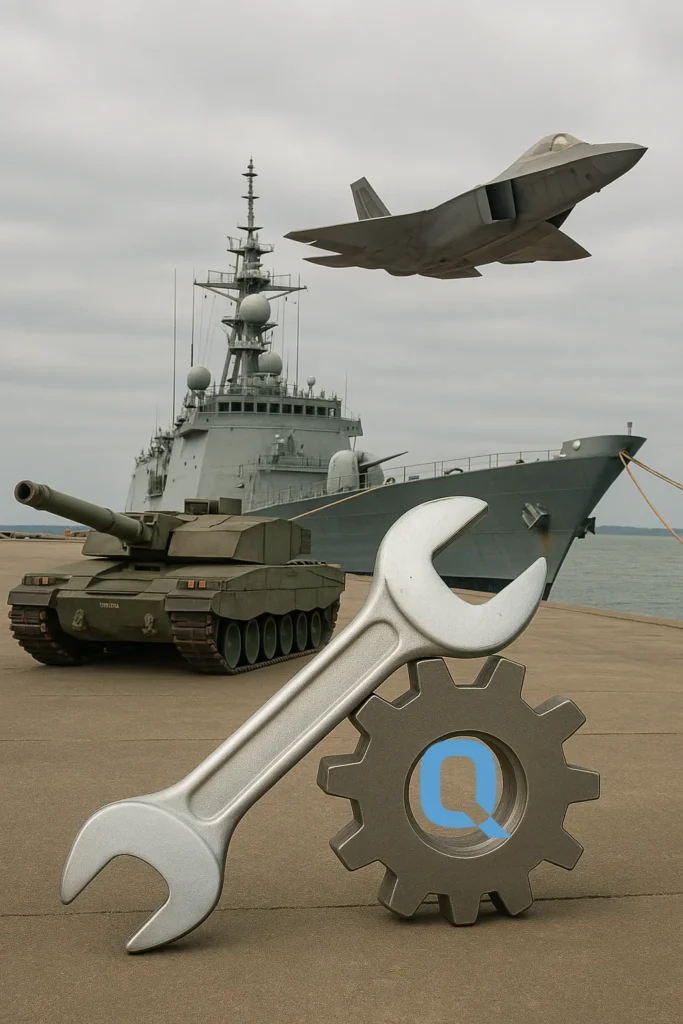What Needs Support Engineering: Hint: It’s More Than You Think

Defence systems are full of complex parts, some big, some small, all expected to work when needed. But what happens when one piece breaks or becomes outdated? Who plans for that, and when? That’s where support engineering comes in. But what needs support engineering?
Any component that can fail, needs care, or must meet strict regulations. From engines to software, spares to training, support engineering keeps systems safe, ready, and reliable across their full lifecycle.
At Quorum, we have spent over 20 years helping defence teams plan for this. Our consultants know what to track, what to test, and how to tie it all together. We work across land, sea, and air systems to build support that lasts.
What Is Support Engineering?
Support engineering makes sure systems can be used, fixed, supplied, and retired without issues. It is not just about keeping spares on shelves. It is about planning for reliability, safety, training, and updates from day one.
We build support into the system early. Our supportability consultants look at how things will fail, how they’ll be fixed, and what’s needed to keep them ready, including spares, tools, people, data, and downtime risks.
We ask simple questions: Will this part break often? Can it be repaired in the field? Is the right training in place? These questions lead to in-depth analysis of every component. By answering these early, we help teams avoid long delays and high costs later.
Support engineering is part of a wider process called Integrated Logistic Support (ILS). It ties together reliability, maintenance, supply, training, and disposal. At Quorum, we turn those tasks into a clear plan that works.
Supporting Defence Components?
A complex system or product like a tank or a warship is more than just steel and firepower. Behind every vehicle are thousands of parts, each with its own support needs. At Quorum, our consultants break down these systems to make sure the right components get the right kind of support.
Take the Challenger 3 tank. It is packed with advanced systems that need reliability, spares, maintenance access, and crew training. For example:
- Powerpack (engine and transmission)
- Turret and weapon control systems
- Active protection systems
- Electronic displays and crew interfaces
- Fire control and targeting sensors
- Communication and data systems
- Air filtration and cooling units
- Let’s not forget about the tools needed to maintain and build vehicles
Each of these must be easy to maintain and backed by clear support data. If one fails, it can hold up the whole platform.
Now think about a naval vessel, like a Type 26 frigate. It runs on tightly integrated systems that cannot afford downtime. These include propulsion, radar, sonar, power supply, and HVAC. We support each system with spares planning, fault diagnostics, and disposal paths. A failed radar or cooling unit isn’t just a small issue, it can take a ship off mission.
Our support starts early, so the risk of failure stays low, and readiness stays high.
Why Electronics and Software Are Never “Set and Forget”
Electronic components and embedded software don’t sit still. Chips become outdated, suppliers shut down, and firmware needs regular updates. In defence, even a small failure in a sensor or control unit can ground a vehicle or blind a radar.
We plan for these changes from the start, tracking component lifecycles, planning upgrades, and mapping out spares and testing tools.
Without support engineering, electronics become a hidden weak point. Our goal is to keep systems running, secure, and repairable, long after the first version leaves the factory.
Don’t Forget the People: Training and Human Factors
Even the best system fails if people can’t use or fix it properly. That is why support engineering includes training, manuals, and human factors. At Quorum, we make sure real users, not just designers are part of the support plan.
We look at how crews interact with controls, displays, and tools. If a panel is hard to reach or a warning light is easy to miss, we flag it early.
We also plan the training needed to keep systems working. That includes hands-on tasks, simulators, and course materials. Whether it is a new radar or a vehicle power unit, we make sure operators and technicians are ready from day one.
Thinking Ahead: Disposal, Safety, and Environment
Support does not end when the system retires. At Quorum, we plan for what happens when parts wear out, break down, or reach the end of their life. That includes how to handle, store, and dispose of them safely.
Many defence components involve fuel, batteries, chemicals, or electronics that need careful treatment. Our consultants build disposal steps into the support plan early, so there are no surprises later.
We also assess risks to people and the environment, finding safer options or add clear handling steps. This helps teams stay safe and meet environmental rules without delays.
Compliance Is Not Optional
Every defence system must meet strict rules on safety, materials, data, and more. At Quorum, we make sure support plans include the right standards from the start. That includes NATO codes, safety rules, and environmental laws.
Missing a requirement can delay a programme or block approval. Our consultants track what applies to each system and make sure all support tasks meet those rules. This includes documentation, maintenance logs, and part traceability.
Compliance also matters when submitting bids. Government agencies will not consider offers that ignore key support standards. A strong support plan shows readiness, safety, and full lifecycle planning. We help clients meet these needs and stay competitive.
It’s Not Just Defence, Other Sectors Use This Too
Support engineering started in defence, but its value is clear across many industries. Anywhere systems must stay running safely over time, support planning makes a difference.
We have seen the same principles used in rail, aerospace, and energy. Airlines use RAM analysis to keep fleets airworthy. Rail networks plan spares and training to reduce downtime. Power plants track failure points and plan maintenance years in advance.
Our consultants have even applied defence support standards to utilities, particularly water providers.
The goals are the same: fewer breakdowns, faster repairs, and safer systems. Whether it is a fighter jet or a passenger train, support engineering keeps things moving.
Why Quorum Tracks All of It

At Quorum, we don’t just focus on one part of the system. We track every support need, reliability, spares, training, safety, and more because they all connect. Miss one, and the whole system can suffer.
Our consultants bring experience from major defence programmes across land, sea, and air. We work closely with your team to build support plans that are clear, complete, and cost-effective.
With over 20 years of supportability experience, we know what to look for and how to plan for it. From bid stage to disposal, we help you stay ready, stay compliant, and stay ahead.
Book an informal chat with Shaun for a free consultation and discover how ILS can propel your operational efficiency and cost-effectiveness to new heights.
Your support engineering insights…



